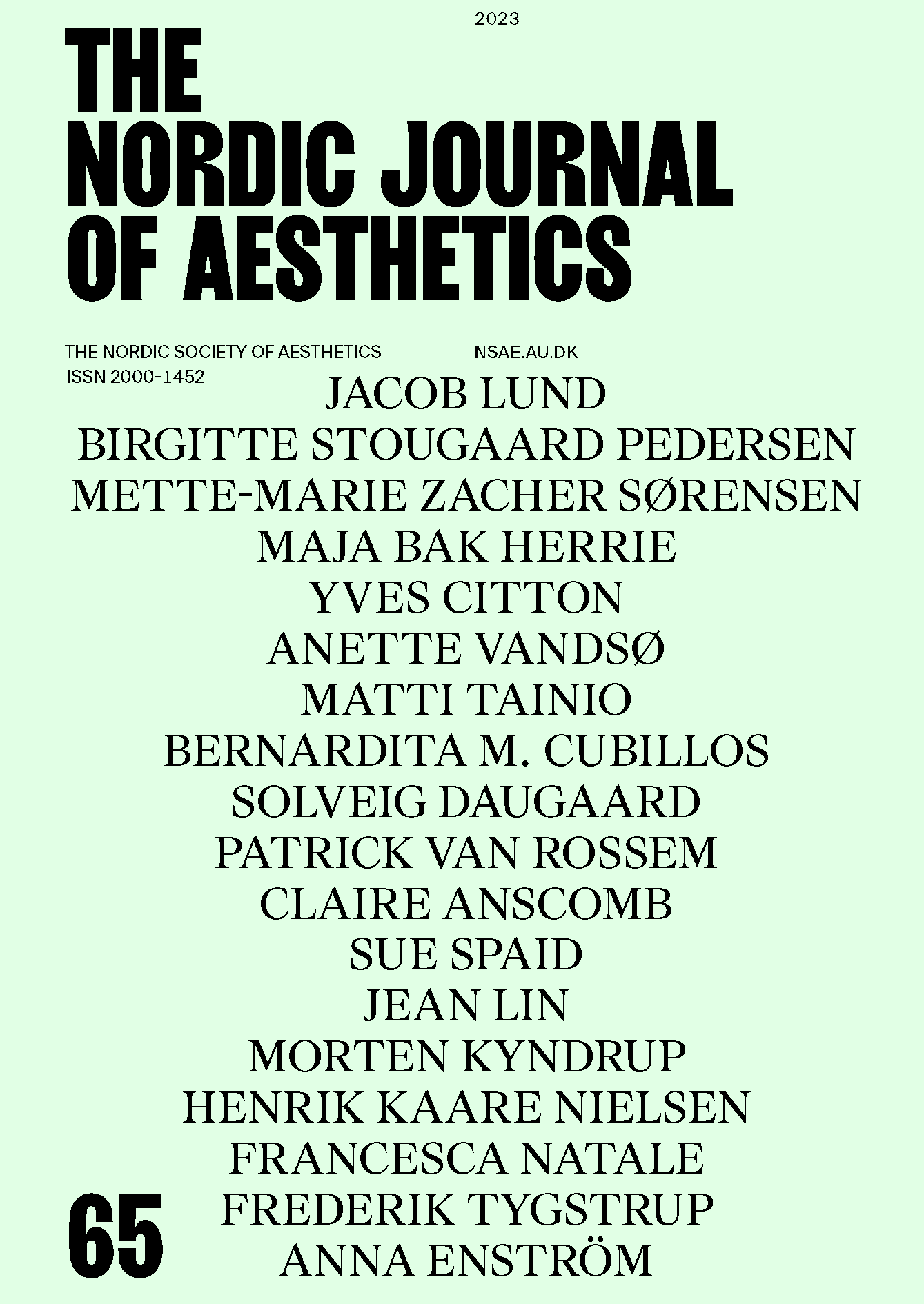Attention Disorders Between Impairment and Ferality: Towards a Political Aesth-Ethics of Dismantlement
DOI:
https://doi.org/10.7146/nja.v32i65-66.140093Keywords:
Attention Studies, ADHD, Disability Studies, Ferality, CollapsologyAbstract
Attention in the 21st century is commonly perceived as being in insufficient supply. Increasing numbers of children and adults are
diagnosed with ADHD (Attention Deficit and Hyperactivity Disorder) worldwide. This article suggests that our understanding of attentional deficits could gain from a double reframing. First, the notion of “impairment” (as recently discussed by Jonathan Sterne) seems more appropriate than the category of “disorder” to unfold the stakes of attentional problems. Second, approaching attentional issues as collective and organizational questions seems more empowering than as individual shortcomings—and the notion of “ferality” (as developed by Anna Tsing and the contributors to the Feral Atlas) provides an enlightening tool to account for the role played by
infrastructures in the production of attentional deficits. As a result, the article sketches two compasses designed to help us develop a “collapsonaut attention” more in tune with the challenges of the Anthropocene.
References
Frederique Ait-Touati, Alexandra Arenes & Axelle Gregoire, Terra Forma: A Book of Speculative Maps (Cambridge, MA: MIT Press, 2022).
Jean-Baptiste Fressoz, L’Apocalypse joyeuse. Une histoire du risque technologique (Paris: Seuil, 2011).
Manola Antonioli et al., Saturations. Individus, collectifs, organisations et territoires à l’épreuve (Grenoble: Elya Editions, 2020).
Franco Berardi, Heroes: Mass Murder and Suicide (New York: Verso, 2015).
Mikkel Bolt Rasmussen, After the Great Refusal: Essays on Contemporary Art, Its Contradictions and Difficulties (London: Zer0Books, 2018).
Benjamin Bratton, The Terraforming 2019 (Moscow: Strelka Press, 2019).
Holly Jean Buck, After Geoengineering: Climate Tragedy, Repair, and Restoration (New York: Verso, 2020).
Luciana Caliman et al., L’attention médicamentée. La Ritaline à l’école (Rennes: Presses Universitaires de Rennes, 2023).
Enrico Campo, Attention and its Crisis in Digital Society (Abington, NY: Routledge, 2022), https://doi.org/10.7551/mitpress/6569.001.0001.
Dipesh Chakrabarty, “The Planet: An Emerging Humanist Category,” Critical Inquiry, 46-1 (2019).
Yves Citton, “Eloge écopolitique de la distraction à l’âge de l’effondrisme,” in Politiques de la distraction, eds. Paul Sztulman and Dork Zabunyan (Dijon: Presses du reel/ArTeC, 2021), 36–55, https://doi.org/10.4000/books.pupo.27163.
Yves Citton, Mediarchy (Cambridge: Polity, 2019).
Yves Citton, “Collapsonaut Attention,” SNSF Research Project Ecodata-Ecomedia-Ecoaesthetics, HGK FHNW Basel, online at https://www.fhnw.ch/de/forschung-und-dienstleistungen/gestaltung-kunst/forschung/forschungsprojekte-desinstituts-kunst-gender-natur-iagn/ecodata-ecomediaecoaesthetics/texts/media/cittoncollapsonautattention-e-final.pdf
Yves Citton & Jacopo Rasmi, Générations collapsonautes. Naviguer par temps d’effondrement (Paris: Seuil, 2020).
William E. Connolly, Facing the Planetary: Entangled Humanism and the Politics of Swarming (Durham: Duke University Press, 2017).
Jonathan Crary, Scorched Earth: Beyond the Digital Age to a Post-Capitalist World (New York: Verso, 2022).
Jonathan Crary, 24/7: Late Capitalism and the Ends of Sleep (New York: Verso, 2014).
Jonathan Crary, Suspensions of Perception. Attention, Spectacle and Modern Culture (Cambridge, MA: MIT Press, 1999).
Ingrid Diran & Antoine Traisnel, “The Birth of Geopower,” Diacritics, 47-3 (2019).
Denise Ferreira da Silva, Toward a Global Idea of Race (Minneapolis: University of Minnesota Press, 2007).
Jennifer Gabrys, “Becoming Planetary,” e-flux Architecture (2018), https://www.e-flux.com/architecture/accumulation/217051/becomingplanetary/.
James J. Gibson, An Ecological Approach to Visual Perception (New York: Psychology Press, 1979), https://doi.org/10.5749/minnesota/9780816679669.003.0001.
Stefano Harney & Fred Moten, All Incomplete (Wivenhoe: Minor Composition, 2021).
Robert Hockey, The Psychology of Fatigue: Work, Effort and Control (Cambridge University Press, 2013).
Tim Ingold, Anthropology and/as Education (London: Routledge, 2017).
Tim Ingold, Lines: A Brief History (London: Routledge, 2007).
Nick Land, “Hyperstition: an Introduction—Interview with Delphi Carstens,” Orpha Drift Archive, http://www.orphandriftarchive.com/articles/hyperstition-anintroduction/, 2009).
Brian Larkin, “The Politics and Poetics of Infrastructure”, Annual Review of Anthropology, 42 (2013), https://doi.org/10.1146/annurev-anthro-092412-155522.
Lukáš Likavčan, Introduction to Comparative Planetology (Moscow: Strelka Press, 2019).
Jacob Lund, Anachrony, Contemporaneity, and Historical Imagination (Berlin: Sternberg Press, 2019).
Erin Manning & Brian Massumi, “Coming Alive in a World of Texture,” in Thought in the Act: Passages in the Ecology of Experience (Minneapolis: University of Minnesota Press, 2014).
Randy Martin, The Financialization of Daily Life (Philadelphia: Temple University Press, 2002).
Alexandre Monnin, Diego Landivar & Emmanuel Bonnet, Héritage et fermeture : une écologie du démantèlement (Paris: Divergences, 2021).
Paul North, The Problem of Distraction (Stanford: Stanford University Press, 2011), https://doi.org/10.4000/books.pupo.27113.
Cedric J. Robinson, The Terms of Order: Political Science and the Myth of Leadership (Raleigh: University of North Carolina Press, 1980).
Alan Schwarz, ADHD Nation. The Disorder. The Drugs. The Inside Story (New York: Little Brown, 2016).
Wilfrid Sellars, “Language, Rules and Behavior,” in John Dewey: Philosopher of Science end Freedom, ed. Sidney Hook (New York: Dial Press, 1949).
Tobin Siebert, Disability Aesthetics (Ann Arbor: University of Michigan Press, 2010).
Tobin Siebert, Disability Theory (Ann Arbor: University of Michigan Press, 2008).
Gayatri Chakravorty Spivak, Imperatives to Re-Imagine the Planet (Wien: Passagen Verlag, 1999).
Pierre Steiner, Désaturer l’esprit. Usages du pragmatisme (Paris: Questions théoriques, 2019).
Jonathan Sterne, Diminished Faculties. A Political Phenomenology of Impairment (Durham: Duke University Press, 2021).
Paul Sztulman and Dork Zabunyan, Politiques de la distraction (Dijon: Presses du reel/ArTeC, 2021).
Susan Wendell, “Toward a Feminist Theory of Disability,” Hypatia, vol. 4, no. 2 (1989), https://doi.org/10.1111/j.1527–2001.1989.tb00576.x.
Sylvia Wynter, On Being Human As Praxis, ed. Katherine McKittrick (Durham: Duke University Press, 2015).
Downloads
Published
How to Cite
Issue
Section
License
Copyright (c) 2023 Yves Citton

This work is licensed under a Creative Commons Attribution 4.0 International License.
Authors who publish with this journal agree to the following terms:
- Authors retain copyright and grant the journal right of first publication with the work simultaneously licensed under a Creative Commons Attribution License that allows others to share the work with an acknowledgement of the work's authorship and initial publication in this journal.
- Authors are able to enter into separate, additional contractual arrangements for the non-exclusive distribution of the journal's published version of the work (e.g., post it to an institutional repository or publish it in a book), with an acknowledgement of its initial publication in this journal.
- Authors are permitted and encouraged to post their work online (e.g., in institutional repositories or on their website) prior to and during the submission process, as it can lead to productive exchanges, as well as earlier and greater citation of published work (See The Effect of Open Access).




